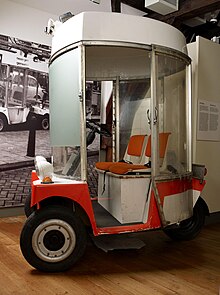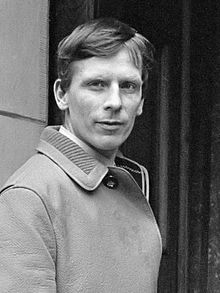Luud Schimmelpennink

Laurens (Luud) Maria Hendrikus Schimmelpennink (born May 27, 1935 in Amsterdam ) is a Dutch politician , inventor and was active in the Provo movement from 1965 to 1967 as well as the initiator of the White Bicycle Plan .
Life
Schimmelpennink trained as a mechanical engineer at the Hogere Technical School (HTS) and was one of the best-known Provos in the mid-1960s thanks to his idea of the Witte Fietsplan (White Bicycle Plan). He supplied the chemicals for the smoke bomb thrown by Peter Bronkhorst on March 10, 1966 at the wedding of Princess Beatrix and Claus von Amsberg . On July 28, 1965, at the weekly happenings by Robert Jasper Grootveld in downtown Amsterdam on the Spui, a leaflet was distributed, Provokatie Nr. 5, in which the white cycle map was presented. The first free bike on Lieverdje was painted white and immediately confiscated by the police because the legally required bike lock was missing. At that time, Schimmelpennink announced that the Provos had founded an Economies Terroristies Raad (pun for Economischer terroristischer Raad ; "Economic terrorist council"), which would bring economic scandals to the public, such as the bankruptcy of the Texeira de Mattos bank . On November 22, 1967, Schimmelpennink was elected as the successor to Provo council member Bernhard de Vries in the Amsterdam council.
inventor
In the local council, Schimmelpennink presented his white bicycle plan with the argument that the bicycles, which can be used free of charge, could make a contribution against urban air pollution. With 2000 bikes, he wanted to implement the plan that was drawn up in 1965. However, the local council rejected his proposal. Thereupon he built an electrically powered three-wheeled car , which was also painted white (Witkar), for 2 people, with a 24 volt electric motor of 2000 watts and a weight of 452 kilograms and a top speed of 30 km / h. Interested parties were able to become members of one of the five existing depots of the Coöperatieve Vereniging Witkar (White Cart Cooperative) . A lifetime membership should cost 25 guilders . After use, the three-wheeled vehicle had to be parked in one of the car garages, where the battery could be charged within seven minutes. On March 21, 1974, then Minister Irene Vorrink opened the first car depot. The cooperative was terminated 12 years later, on October 27, 1986, because the goal of 25 car depots with a total of 125 three-wheeled cars was not achieved.
With his foundation Y-tech-Innovaties , Schimmelpennink brought a covered recumbent bike (“Ligfiets”) and a modern transport bike onto the market. In September 1999, the White Bicycle Plan was to be restarted with modern technology with 250 bikes and six depots . The Ministry for Verkeer en Waterstaat invested one million guilders , the telephone company KPN provided the technical means and the municipality of Amsterdam wanted to help finance the six bike depots. The Gemeentevervoerbedrijf (GVB) of Amsterdam was supposed to run the project. The GVB project manager had planned 20 depots in March 2000, but technical difficulties delayed the initiative and the GVB wanted to have a new computer program written to solve the problems.
Luud Schimmelpennink is represented on the Amsterdam City Council for the Partij van de Arbeid (PvdA) and was on the municipal commissions for building, housing and urban development ( Commissie Bouwen, Wonen en Stedelijke Ontwikkeling ) and on the Commission for Social Affairs and Education ( Commissie Welzijn en Onderwijs ) actively active. On May 8, 2009, the PvdA announced on its editorial website that commercial companies, together with the municipality of Amsterdam, are seriously considering Schimmelpennink's plan again in order to implement the Witkar initiative.
In 2008 Schimmelpennink received the Sustainable Mobility Pioneer Award for its "white plans".
Web links
- The Witkars of Amsterdam from Time magazine, June 17, 1974. English.
- Article about the Witkar ; English, Dutch; with photos. June 28, 2002.
- Information about the Witkar initiative from the municipality of Amsterdam ; Dutch.
- White Bicycle Plan at the International Institute for Social History, Amsterdam. English, with photo.
Individual evidence
- ↑ Archief Coöperatieve Vereniging Witkar. Period 1968-1987 . “Cooperative White Cart”. In the archive of the International Institute for Social History
- ^ In the archive of the Trouw newspaper , December 10, 1999 . Former Provoplan fails due to modern technology. Dutch, Retrieved July 2, 2009
| personal data | |
|---|---|
| SURNAME | Schimmelpennink, Luud |
| ALTERNATIVE NAMES | Schimmelpennink, Laurens Maria Hendrikus |
| BRIEF DESCRIPTION | Dutch inventor and politician |
| DATE OF BIRTH | May 27, 1935 |
| PLACE OF BIRTH | Amsterdam |

